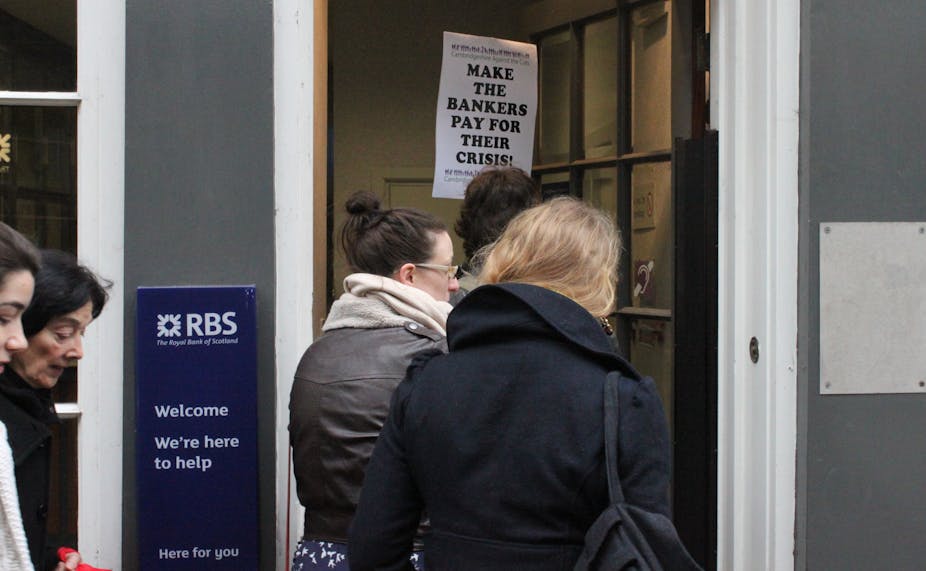Ever since the financial crisis began in 2007-08, there has been much debate around the responsibilities of mainstream banks – should they serve shareholders or stakeholders? What is their mission? Do they have a responsibility towards local communities?
What most of us can agree on is that banks should provide access to appropriate, affordable financial products and services. But first they have to regain customers’ trust after numerous mis-selling scandals such as payment protection insurance.
They are trying to market themselves as standing for fair, responsible banking for example, “Goodbye unfair banking. Hello Natwest”. Some have agreed to make their lending decisions more transparent and accountable by disclosing how much they are lending consumers and small businesses. Yet many are also continuing to close high-street branches, moving away from providing local face-to-face services.
The NEF model
In this context, the New Economics Foundation (NEF) has published a report, arguing that the 81%-state-owned RBS could have a greater benefit to local economies and communities if it was split into 130 local banks across the UK. Instead of being returned to its old listed model in the private sector, these smaller banks would follow a public benefit trust model akin to the retailer John Lewis.
The NEF’s rationale is that this would give consumers access to better products and services by promoting more competition between the banks and creating an alternative business model. It would also revitalise local economies by providing credit to small business and consumers that have been unable to access it affordably since the start of the financial crisis.
By restructuring RBS into the likes of the Royal Bank of Cornwall and Bank of Birmingham, the NEF suggests that the economy could be rebalanced away from the City of London, thereby promoting greater job security and economic resilience. The government would benefit through increased taxation and fewer social-security payments, it argues.
The vision is that these institutions would balance social and economic objectives – as opposed to purely profit-driven banks with supposedly little benefit to local economies. Any surpluses would be reinvested back into lending.

The network dimension
The banks would be organised into a national network, which would spread risk to the same extent as the other high-street banks through a system of mutual guarantees. The banks in the network would then reduce their costs and further cut financial risks by sharing back-office systems.
Drawing on the value of local relationship knowledge to inform lending seen in the likes of credit unions and stakeholder banks, the NEF suggests that the local banks would use this alongside the centralised credit scoring that high-street banks rely on.
The foundation may be ignoring other tensions between a centralised network and local operations that need pointing out, though. Staff would need training in an approach that was less dependent on credit scoring. This would take time to institute effectively. There is also the problem that relationship lending is expensive. The losses that the high-street banks incurred drove them towards using centralised credit scoring to manage risk in the first place.
Financial inclusion
If RBS were to be restructured into local banks in this way, they would play an important role in providing financially inclusive products and services. But unlike what NEF implies, this is not just about providing access to local branches and rectifying the fact that some parts of the country are far better served than others.
It is about inability to access finance and banks “redlining” areas within which they will not lend. It is about the conditions they attach to financial products, such as offering “free” travel insurance only to those who deposit over £750 per month into their bank account. Other problems include the affordability of their products and services, and self-exclusion, where people who don’t think they will be able to access products don’t apply.
Financial inclusion does entail a greater range of products and services and hence higher costs. But this would be offset against the economies of scale that come from being in a banking network, as well as through partnerships with other organisations such as credit unions and community development finance institutions to share best practice and ensure that if the bank is unable to help they are referred to other institutions that may be able to do so.
In short, the financial crisis has reminded us that banks have a responsibility to provide appropriate, affordable products and services for consumers and enterprises in a transparent way. Though there are definitely potential pitfalls around the cost of relationship lending and proper financial inclusion, restructuring RBS into a network of local banks would be a powerful way of reforming retail banking in a way that helps meet social goals and promotes growth away from the South East. If George Osborne implemented these NEF recommendations, it would be a radical and welcome move.

